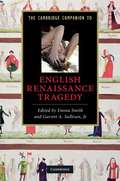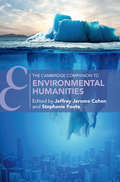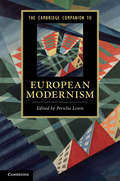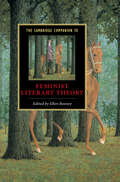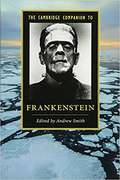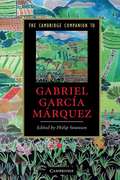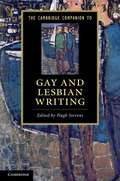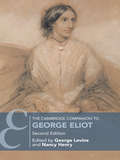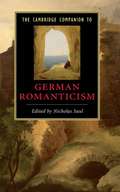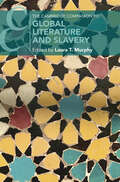- Table View
- List View
The Cambridge Companion to English Poets
by Claude RawsonThis volume provides lively and authoritative introductions to twenty-nine of the most important British and Irish poets from Geoffrey Chaucer to Philip Larkin. The list includes, among others, Shakespeare, Donne, Milton, Wordsworth, Browning, Yeats and T. S. Eliot, and represents the tradition of English poetry at its best. Each contributor offers a new assessment of a single poet's achievement and importance, with readings of the most important poems. The essays, written by leading experts, are personal responses, written in clear, vivid language, free of academic jargon, and aim to inform, arouse interest, and deepen understanding.
The Cambridge Companion to English Renaissance Tragedy
by Emma Smith Garrett A. Sullivan JrFeaturing essays by major international scholars, this Companion combines analysis of themes crucial to Renaissance tragedy with the interpretation of canonical and frequently taught texts. Part I introduces key topics, such as religion, revenge, and the family, and discusses modern performance traditions on stage and screen. Bridging this section with Part II is a chapter which engages with Shakespeare. It tackles Shakespeare's generic distinctiveness and how our familiarity with Shakespearean tragedy affects our appreciation of the tragedies of his contemporaries. Individual essays in Part II introduce and contribute to important critical conversations about specific tragedies. Topics include The Revenger's Tragedy and the theatrics of original sin, Arden of Faversham and the preternatural, and The Duchess of Malfi and the erotics of literary form. Providing fresh readings of key texts, the Companion is an essential guide for all students of Renaissance tragedy.
The Cambridge Companion to English Restoration Theatre
by Deborah Payne FiskThis rich and varied portrait of drama from 1660 to 1714 provides students with essential information about playwrights, staging and genres in their social and political context. The theater that followed the Restoration of Charles II is revealed in all of its tumult, energy and conflict. Contributors pay attention to major and minor playwrights, the first professional female dramatists, the performance aspects of the drama and the main dramatic genres and themes.
The Cambridge Companion to English Short Story: The Cambridge Companion to the English Short Story
by Ann-Marie EinhausThis Companion provides an accessible overview of short fiction by writers from England, Scotland, Ireland, Wales, and other international sites. A collection of international experts examine the development of the short story in a variety of contexts from the early nineteenth century to the present. They consider how dramatic changes in the publishing landscape during this period - such as the rise of the fiction magazine and the emergence of new opportunities in online and electronic publishing - influenced the form, covering subgenres from detective fiction to flash fiction. Drawing on a wealth of critical scholarship to place the short story in the English literary tradition, this volume will be an invaluable guide for students of the short story in English.
The Cambridge Companion to Environmental Humanities (Cambridge Companions to Literature)
by Jeffrey Jerome Cohen Stephanie FooteThis Companion offers a comprehensive and accessible introduction to the environmental humanities, an interdisciplinary movement that responds to a world reconfigured by climate change and its effects, from environmental racism and global migration to resource impoverishment and the importance of the nonhuman world. It addresses the twenty-first century recognition of an environmental crisis – its antecedents, current forms, and future trajectories – as well as possible responses to it. This books foregrounds scholarship from different periods, fields, and global locations, but it is organized to give readers a working context for the foundational debates. Each chapter examines a key topic or theme in Environmental Humanities, shows why that topic emerged as a category of study, explores the different approaches to the topics, suggests future avenues of inquiry, and considers the topic's global implications, especially those that involve environmental justice issues.
The Cambridge Companion to Eugene O'Neill
by Michael ManheimThis volume of specially commissioned essays contains studies of O'Neill's life, his intellectual and creative forebears, and his relation to the theatrical world of his creative period, 1916-1942. Also included are descriptions of the O'Neill canon and its production history on stage and screen, and a series of essays on "special topics" related to the playwright. One of the essays speaks for those who are critical of O'Neill's work, and the volume concludes with an essay on O'Neill criticism containing a select bibliography of full-length studies of the playwright's work.
The Cambridge Companion to European Modernism
by Pericles LewisModernism arose in a period of accelerating globalization in the late nineteenth century. Modernist writers and artists, while often loyal to their country in times of war, aimed to rise above the national and ideological conflicts of the early twentieth century in service to a cosmopolitan ideal. This Companion explores the international aspects of literary modernism by mapping the history of the movement across Europe and within each country. The essays place the various literary traditions within a social and historical context and set out recent critical debates. Particular attention is given to the urban centers in which modernism developed from Dublin to Zurich, Barcelona to Warsaw and to the movements of modernists across national borders. A broad, accessible account of European modernism, this Companion explores what this cosmopolitan movement can teach us about life as a citizen of Europe and of the world.
The Cambridge Companion to European Novelists
by Michael BellA lively and comprehensive account of the whole tradition of European fiction for students and teachers of comparative literature, this volume covers twenty-five of the most significant and influential novelists in Europe from Cervantes to Kundera. Each essay examines an author's use of, and contributions to the genre, and also engages in an important aspect of the form, such as its relation to romance or one of its sub-genres, such as the Bildungsroman. Larger theoretical questions are introduced through specific readings of exemplary novels. Taking a broad historical and geographic view, the essays keep in mind the role the novel itself has played in the development of European national identities and in cultural history over the last four centuries. While conveying essential introductory information for new readers, these authoritative essays reflect up-to-date scholarship and also review, and sometimes challenge, conventional accounts.
The Cambridge Companion to F. Scott Fitzgerald
by Ruth PrigozyEleven specially commissioned essays by major Fitzgerald scholars present a clearly written and comprehensive assessment of F. Scott Fitzgerald as a writer and as a public and private figure. No aspect of his career is overlooked, from his first novel published in 1920, through his more than 170 short stories, to his last unfinished Hollywood novel. Contributions present the reader with a full and accessible picture of the background of American social and cultural change in the early decades of the twentieth century. The introduction traces Fitzgerald's career as a literary and public figure, and examines the extent to which public recognition has affected his reputation among scholars, critics, and general readers over the past sixty years. This volume offers undergraduates, graduates and general readers a full account of Fitzgerald's work as well as suggestions for further exploration of his work.
The Cambridge Companion to Fairy Tales
by Maria TatarFairy tales have never known geographical, disciplinary or cultural borders. In many ways, they provide a model for thinking about storytelling on a transnational level long before comparative literature began transforming itself into world literature. As the simple expression of complex thought, fairy tales have increasingly become the focus of intense scholarly inquiry. In this Companion, international scholars from a range of academic disciplines explore the historical origins, cultural dissemination and psychological power of fairy stories, and offer model interpretations of tales from a variety of traditions and sources, including Charles Perrault, the Brothers Grimm and the One Thousand and One Nights. Rather than disenchanting the stories, the essays in this volume broaden our understanding of them and deepen our appreciation of the cultural work they do. A chronology and guide to further reading contribute to the usefulness of the volume for students and scholars.
The Cambridge Companion to Fantasy Literature
by Farah Mendlesohn Edward JamesFantasy is a creation of the Enlightenment and the recognition that excitement and wonder can be found in imagining impossible things. From the ghost stories of the Gothic to the zombies and vampires of twenty-first-century popular literature, from Mrs Radcliffe to Ms Rowling, the fantastic has been popular with readers. Since Tolkien and his many imitators, however, it has become a major publishing phenomenon. In this volume, critics and authors of fantasy look at the history of fantasy since the Enlightenment, introduce readers to some of the different codes for the reading and understanding of fantasy and examine some of the many varieties and subgenres of fantasy; from magical realism at the more literary end of the genre, to paranormal romance at the more popular end. The book is edited by the same pair who edited The Cambridge Companion to Science Fiction (winner of a Hugo Award in 2005).
The Cambridge Companion to Feminist Literary Theory
by Ellen RooneyFeminism has dramatically influenced the way literary texts are read, taught and evaluated. Feminist literary theory has deliberately transgressed traditional boundaries between literature, philosophy and the social sciences in order to understand how gender has been constructed and represented through language. This lively and thought-provoking Companion presents a range of approaches to the field. Some of the essays demonstrate feminist critical principles at work in analysing texts, while others take a step back to trace the development of a particular feminist literary method. The essays draw on a range of primary material from the medieval period to postmodernism and from several countries, disciplines and genres. Each essay suggests further reading to explore this field further. This is the most accessible guide available both for students of literature new to this developing field, and for students of gender studies and readers interested in the interactions of feminism, literary criticism and literature.
The Cambridge Companion to Fiction in the Romantic Period
by Richard Maxwell Katie TrumpenerWhile poetry has been the genre most closely associated with the Romantic period, the novel of the late eighteenth and early nineteenth centuries has attracted many more readers and students in recent years. Its canon has been widened to include less well known authors alongside Jane Austen, Walter Scott, Maria Edgeworth and Thomas Love Peacock. Over the last generation, especially, a remarkable range of popular works from the period have been re-discovered and reread intensively. This Companion offers an overview of British fiction written between roughly the mid-1760s and the early 1830s and is an ideal guide to the major authors, historical and cultural contexts, and later critical reception. The contributors to this volume represent the most up-to-date directions in scholarship, charting the ways in which the period's social, political and intellectual redefinitions created new fictional subjects, forms and audiences.
The Cambridge Companion to Flaubert
by Timothy UnwinThis volume brings together a series of essays by acknowledged experts on Flaubert. It offers a coherent overview of the writer's work and critical legacy, and provides insights into the very latest scholarly thinking. While a central place is given to Flaubert's most widely read texts, attention is also paid to key areas of the corpus that have tended to be overlooked. Close textual analyses are accompanied by discussion of broader theoretical issues, and by a consideration of Flaubert's place in the wider traditions that he both inherited and influenced. These essays provide not only a robust critical framework for readers of Flaubert, but also a fuller understanding of why he continues to exert such a powerful influence on literature and literary studies today. A concluding essay by the prize-winning author Mario Vargas Llosa examines Flaubert's legacy from the point of view of the modern novelist.
The Cambridge Companion to Frances Burney
by Peter SaborFrances Burney (1752-1840) was the most successful female novelist of the eighteenth century. Her first novel Evelina was a publishing sensation; her follow-up novels Cecilia and Camilla were regarded as among the best fiction of the time and were much admired by Jane Austen. Burney's life was equally remarkable: a protegee of Samuel Johnson, lady-in-waiting at the court of George III, later wife of an emigre aristocrat and stranded in France during the Napoleonic Wars, she lived on into the reign of Queen Victoria. Her journals and letters are now widely read as a rich source of information about the Court, social conditions and cultural changes over her long lifetime. This Companion is the first volume to cover all her works, including her novels, plays, journals and letters, in a comprehensive and accessible way. It also includes discussion of her critical reputation, and a guide to further reading.
The Cambridge Companion to Frankenstein
by Andrew SmithThe Cambridge Companion to Frankenstein consists of sixteen original essays on Mary Shelley's novel by leading scholars, providing an invaluable introduction to Frankenstein and its various critical contexts. Theoretically informed but accessibly written, this volume relates Frankenstein to various social, literary, scientific and historical contexts, and outlines how critical theories such as ecocriticism, posthumanism, and queer theory generate new and important discussion in illuminating ways. The volume also explores the cultural afterlife of the novel including its adaptations in various media such as drama, film, television, graphic novels, and literature aimed at children and young adults. Written by an international team of leading experts, the essays provide new insights into the novel and the various critical approaches which can be applied to it. The volume is an essential guide to students and academics who are interested in Frankenstein and who wish to know more about its complex literary history.
The Cambridge Companion to French Literature
by John D. LyonsIn this authoritative and accessible account of French literature, sixteen essays by leading specialists offer provocative insights into French literary culture, its genres, movements, themes, and historic turning points, including the cultural and linguistic challenges of today's multi-ethnic France. The French have, over the centuries, invented and reinvented writing, from the Arthurian romances of Chrétien de Troyes to Montaigne's Essays, which gave the world a new literary form and a new standard for writing about personal thought and experience; from the highly polished tragedies of French classicism to the satirical novels of the Enlightenment; from Proust's explorations of social and sexual mores to the 'New Novel' of the late twentieth century; and from Baudelaire's urban poetry to today's poetic experiments with sound and typography. The broad scope of this Companion, which goes beyond individual authors or periods, enables a deeper appreciation for the distinctive literature of France.
The Cambridge Companion to Gabriel García MáRquez
by Philip SwansonGabriel García Márquez is Latin America's most internationally famous and successful author, and a winner of the Nobel Prize. His oeuvre of great modern novels includes One Hundred Years of Solitude and Love in the Time of Cholera. His name has become closely associated with Magical Realism, a phenomenon that has been immensely influential in world literature. This Companion includes new and probing readings of all of García Márquez's works, by leading international specialists. His life in Colombia, the context of Latin American history and culture, key themes in his works and their critical reception are explored in detail. Written for students and readers of García Márquez, the Companion is accessible for non-Spanish speakers and features a chronology and a guide to further reading. This insightful and lively book will provide an invaluable framework for the further study and enjoyment of this major figure in world literature.
The Cambridge Companion to Gay and Lesbian Writing
by Hugh StevensIn the last two decades, lesbian and gay studies have transformed literary studies and developed into a vital and influential area for students and scholars. This 2010 Companion introduces readers to the range of debates that inform studies of works by lesbian and gay writers and of literary representations of same-sex desire and queer identities. Each chapter introduces key concepts in the field in an accessible way and uses several important literary texts to illustrate how these concepts can illuminate our readings of them. Authors discussed range from Henry James, E. M. Forster and Gertrude Stein to Sarah Waters and Carol Ann Duffy. The contributors showcase the wide variety of approaches and theoretical frameworks that characterise this field, drawing on related themes of gender and sexuality. With a chronology and guide to further reading, this volume offers a stimulating introduction to the diversity of approaches to lesbian and gay literature.
The Cambridge Companion to George Bernard Shaw
by Christopher InnesThe Cambridge Companion to George Bernard Shaw is an indispensable guide to one of the most influential and important dramatists of the theatre. The volume offers a broad-ranging study of Shaw with essays by a team of leading scholars. The Companion covers all aspects of Shaw's drama, focusing on both the political and theatrical context, while the extensive illustrations showcase productions from the Shaw Festival in Canada. In addition to situating Shaw's work in its own time, the Companion demonstrates its continuing relevance, and applies some of the newest critical approaches. Topics include Shaw and the publishing trade, Shaw and feminism, and Shaw and the Empire, as well as analyses of the early plays, discussion plays and history plays.
The Cambridge Companion to George Eliot
by George LevineThis volume of specially-commissioned essays provides accessible introductions to all aspects of George Eliot's writing by some of the most distinguished new and established scholars and critics of Victorian literature. The essays are comprehensive, scholarly and lucidly written, and at the same time offer original insights into the work of one of the most important Victorian novelists, and into her complex and often scandalous career. Discussions of her life, the social, political, and intellectual grounding of her work, and her relation to Victorian feminism provide valuable criticism of everything from her early journalism to her poetry. Each essay contributes to a new understanding of the great fiction, from Adam Bede and The Mill on the Floss to Daniel Deronda. With its supplementary material, including a chronology and a guide to further reading, this Companion is an invaluable tool for scholars and students alike.
The Cambridge Companion to George Eliot (Cambridge Companions to Literature)
by George Levine Nancy HenryThis second edition of The Cambridge Companion to George Eliot includes several new chapters, providing an essential introduction to all aspects of Eliot's life and writing. Accessible essays by some of the most distinguished scholars of Victorian literature provide lucid and original insights into the work of one of the most important writers of the nineteenth century, author most famously of Middlemarch, Adam Bede, The Mill on the Floss, and Daniel Deronda. From an introduction that traces her originality as a realist novelist, the book moves on to extensive considerations of each of Eliot's novels, her life and her publishing history. Chapters address the problems of money, philosophy, religion, politics, gender and science, as they are developed in her novels. With its supplementary materials, including a chronology and an extensive section of suggested readings, this Companion is an invaluable tool for scholars and students alike.
The Cambridge Companion to George Orwell
by John RoddenGeorge Orwell is regarded as the greatest political writer in English of the twentieth century. The massive critical literature on Orwell has not only become extremely specialized, and therefore somewhat inaccessible to the nonscholar, but it has also attributed to and even created misconceptions about the man, the writer and his literary legacy. For these reasons, an overview of Orwell's writing and influence is an indispensable resource. Accordingly, this Companion serves as both an introduction to Orwell's work and furnishes numerous innovative interpretations and fresh critical perspectives on it. Throughout the Companion, Orwell's work is also placed within the context of political and social climate of the time. His response to the Depression, British imperialism, Stalinism, World War II, and the politics of the British Left are all examined. Chapters also discuss Orwell's status among intellectuals and in the literary academy.
The Cambridge Companion to German Romanticism
by Nicholas SaulThe late eighteenth and early nineteenth centuries saw an extraordinary flowering of arts and culture in Germany which produced many of the world's finest writers, artists, philosophers and composers. This volume offers students and specialists an authoritative introduction to that dazzling cultural phenomenon, now known collectively as German Romanticism. Individual chapters not only introduce the reader to individual writers such as Friedrich Schlegel, Novalis, Eichendorff, Heine, Hoffmann, Kleist, Schiller and Tieck, but also treat key concepts of Romantic music, painting, philosophy, gender and cultural anthropology, science and criticism in concise and lucid language. All German quotations are translated to make this volume fully accessible to a wide audience interested in how Romanticism evolved across Europe. Brief biographies and bibliographies are supplemented by a list of primary and secondary further reading in both English and German.
The Cambridge Companion to Global Literature and Slavery (Cambridge Companions to Literature)
by Laura T. MurphyThe Cambridge Companion to Global Literature and Slavery reveals the way recent scholarship in the field of slavery studies has taken a more expansive turn, in terms of both the geographical and the temporal. These new studies perform area studies-driven analyses of the representation of slavery from national or regional literary traditions that are not always considered by scholars of slavery and explore the diverse range of unfreedoms depicted therein. Literary scholars of China, Central Asia, the Middle East, and Africa provide original scholarly arguments about some of the most trenchant themes that arise in the literatures of slavery – authentication and legitimation, ethnic formation and globalization, displacement, exile, and alienation, representation and metaphorization, and resistance and liberation. This Cambridge Companion to Global Literature and Slavery is designed to highlight the shifting terrain in literary studies of slavery and collectively challenge the reductive notion of what constitutes slavery and its representation.

